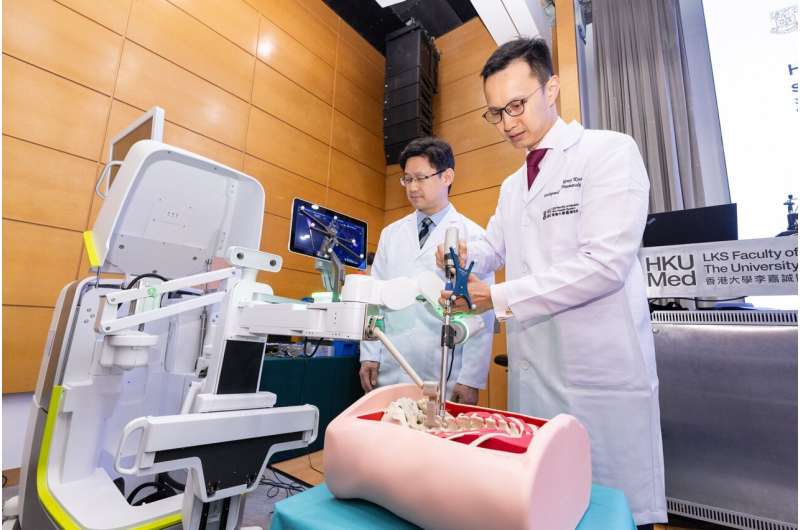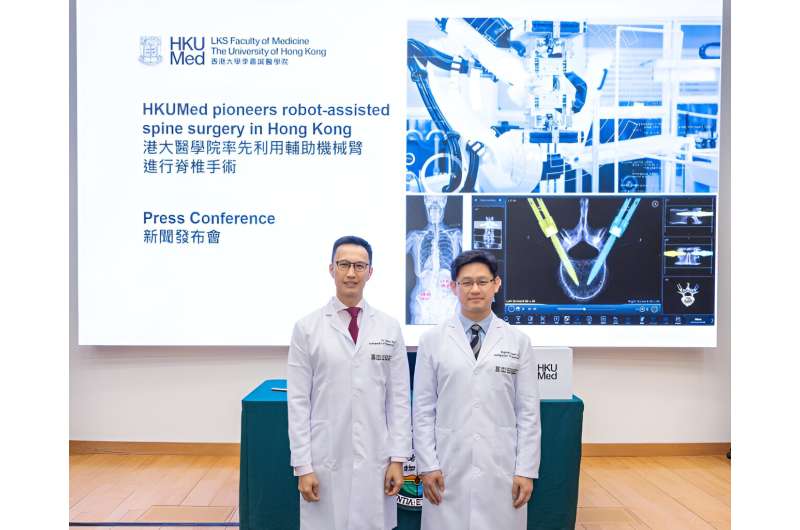This article has been reviewed according to Science X's editorial process and policies. Editors have highlighted the following attributes while ensuring the content's credibility:
fact-checked
trusted source
proofread
Hong Kong team pioneers robot-assisted spinal surgery

In a groundbreaking development, a research team from the Department of Orthopedics and Traumatology of the School of Clinical Medicine in the LKS Faculty of Medicine of the University of Hong Kong (HKUMed) have introduced robot-assisted technology in spine surgery. This is the first time this advanced approach has been used in the city to assist with guidance for instrumentation during spinal surgery.
The team has successfully performed robot-guided spinal procedures for 20 patients since October 2023. The joint-team surgeries were carried out by the Division of Spine Surgery, Department of Orthopedics and Traumatology, School of Clinical Medicine, HKUMed, Queen Mary Hospital and Duchess of Kent Children's Hospital. The use of robotic technology in spine surgery allows for unprecedented precision, safety and minimally invasive approaches, benefiting patients with enhanced surgical outcomes, reduced risk of complications and better revision rates.
Spinal fusion surgery often requires the use of spinal instrumentation, which is particularly important in the treatment of scoliosis, a spine deformity condition that is common among children.
In adult patients, instrumentation is commonly used to address issues like back pain, an unstable and/or deformed spine, or a fractured spinal column. Surgeons typically need to place screws into the deformed spine to facilitate correction and fusion of the spine.
The traditional method of screw insertion into the spine uses the freehand technique, which relies on the surgeon's anatomical knowledge, surgical experience and intraoperative X-ray checks to guide the placement. While skilled surgeons can achieve great precision with their expertise, the accuracy of screw placement has not reached 100%.

Cutting-edge robotic technology in local spine surgery
Since October 2023, 20 robotic spine surgeries have been performed with patients ranging from the teens to the 70s. One patient of note was a 72-year-old woman with degenerative kyphoscoliosis, presenting with back pain and difficulties in walking more than 10 minutes at a time. Traditionally, the surgery would be performed with freehand screw insertion, which is dependent on the surgeon's experience.
This novel technology allowed the team to utilize preoperative surgical planning software to determine the best implant strategy for optimal surgical correction. Intraoperatively, the surgery was executed according to the preoperative plan and with the assistance of the surgical robot, and the implants were inserted without stress or difficulty. Despite a lengthy surgery, it was completed smoothly and successfully.
Delivering greater precision and safer outcomes
The spine robotic system allows for preoperative planning incorporating CT images of the patient's spine as part of the system. The surgeon plans the ideal entry point, screw size and trajectory tailored to each patient's unique anatomy and the predicted screw alignment in the spine. During surgery, the spine robotic arm is precisely guided to the pre-planned position.
The robotic guidance system also provides surgeons with real-time images of the patient's spine, helping them achieve an unparalleled level of accuracy and precision when implanting the screw. This is a significant improvement over the traditional 'freehand' technique, which relies heavily on the surgeon's experience and estimates.
"This innovative technology was introduced to public hospitals in Hong Kong in October 2023, offering local patients access to cutting-edge treatment options. The technology empowers surgeons to deliver the best possible outcomes for their patients when performing complex spinal procedures," said Dr. Kenny Kwan Yat-hong, Clinical Associate Professor and Chief of Division of Spine Surgery, Department of Orthopaedics and Traumatology, School of Clinical Medicine, HKUMed.
"We believe this revolutionary approach is a game-changer for local patients with scoliosis or other spinal problems, improving the accuracy and safety of instrumentation during spinal surgery, reducing the rate of revision surgery, increasing operating efficiency, reducing post-operative complications, and decreasing the length of hospital stays. We believe that there will be further applications of robotic systems in spinal surgery in the near future, resulting in shorter operation times and reduced waiting lists for spinal surgery," added Dr. Kwan.
Professor Jason Cheung Pui-yin, Chairperson of the Department of Orthopedics and Traumatology, School of Clinical Medicine, HKUMed, stated that the launch of this novel technology in public hospitals in Hong Kong represents a major milestone in advancing the field of spinal surgery in the city.
He explained, "The enhanced precision and predictability of robot-assisted spine surgery mean that we can provide our patients with safer, more effective treatments, leading to faster recovery and better long-term outcomes. We are truly excited about the transformative potential of this advanced spine robotic system and the doors it opens for our team to push the boundaries of what is possible in the world-class treatment of spinal disorders."
The novel robot-assisted spine surgeries were carried out by a team of surgeons from the School of Clinical Medicine at HKUMed, led by Dr. Kenny Kwan Yat-hong, Clinical Associate Professor and Chief of Division of Spine Surgery; and Professor Jason Cheung Pui-yin, Clinical Professor and Chairperson, Department of Orthopedics and Traumatology.




















